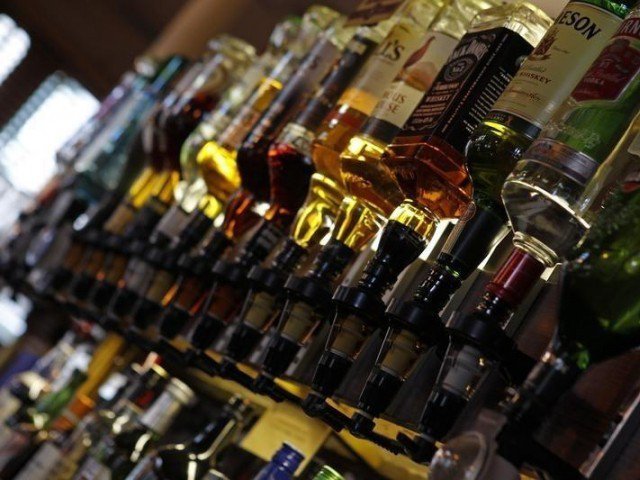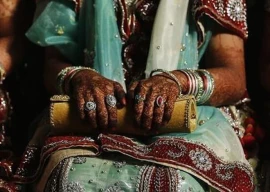
A two-judge bench, headed by Chief Justice Sajjad Ali Shah, directed the provincial police chief to submit a compliance report by Friday (today). However, the bench gave the Sindh government 30 days to develop a mechanism in consultation with all stakeholders, including members of minority communities and wine shop owners, to come up with a ‘practical, transparent and implementable mechanism’, to ensure only licensed shops sell liquor to non-Muslims, both local and foreign, in compliance with quota restrictions.
The judges directed Advocate-General Barrister Zamir Ghumro to submit the draft mechanism within the timeframe set by the court.
Additionally, the court ordered the director general excise to maintain proper record of wine/liquor sales, besides making it publicly available. The bench heard the matter afresh after the Supreme Court suspended its November 2016 order for shutting down all liquor stores.
During Thursday’s proceedings, Ghumro told the bench that a meeting had taken place with all stakeholders, but requested some time to submit a conclusive report, which was granted.
On the other hand, representatives of minority communities reiterated that the current mechanism for operating wine shops, selling wine and liquor without confirming the religious background of buyers or keeping any record, tended to facilitate the sale of liquor suiting the needs of the Muslim community instead of non-Muslims.
Bishop Khadim Bhutto said wine shops were routinely closed on Fridays and also during the entire month of Ramazan. “These days, Christians are fasting, but wine shops are open throughout week,” he added.
Ramesh Kumar, the spokesperson for the Hindu community, wondered whether the current sale mechanism through 120 wine shops across Sindh really catered to the needs of slightly over a million non-Muslims. He said the figure was too inflated when compared with figures for Punjab, where the non-Muslim population was nearly the same (1.1 million), while the number of wine shops was less than 20. He contended that wine shops in Sindh sold liquor ‘not necessarily to non-Muslims’.
During the proceedings, DG Excise Shoaib Siddiqui had no clue about the controversy. He kept changing his position about the quota for non-Muslims. He could not provide any assistance on allegations that there was nothing to justify the quota of six bottles (of one liter each) per month as notified in a notification dated May 29, 2004.
Therefore, lawyers representing wine shop owners, the AG Sindh and the DG Excise conceded that the mechanism of granting a permit under Rule 11 of the Sindh Prohibition Rules 1979 was not adhered to any more under which permits were granted to non-Muslims.
The rules necessitated all permit-holders to be registered at a particular wine shop where all individual purchases needed to be entered into a register besides ensuring religious backgrounds and quota allocations.
The bench observed: “It further surfaced that … this mandatory requirement imposed by the said Rule of 1979 made under the Prohibition (Enforcement Hudood) Ordinance 1979, is violated to the extent that at the moment throughout … Sindh, where there are 120 wine shops, there is not a single permit holder in the record of Excise Department. Meaning thereby not only the Rules are completely violated, the mechanism envisaged by the aforesaid legislation, is neither in place resulting that there is no check on the quantity of wine/liquor sold to any individual, nor there is certainty that the individual is a Muslim or not.”
Advocate Shaikh Javed Mir, who appeared for wine shop owners, contended that a letter had been issued requiring permit holders to freely sell liquor on production of NIC. But, he was unable to place a copy of such a letter before the court.
“Be that as it may be, all those present agreed that no legislative changes have so far been made to amend the mechanism set up by the Sindh Prohibition Rules, 1979 where permits as per Form-PR III were to be given to the non-Muslims, who wanted to buy wine/liquor,” the bench observed.
Lawyers for both sides unanimously complained that the current lack of mechanism for the sale of wine/liquor to non-Muslims in restricted quantities and only on religious occasions fueled the grievance of petitioners that wine and liquor was sold as soft drinks all over the province. They agreed that a mechanism had to be put in place in line with the Hadd Ordinance, 1979 and Prohibition Rules to ensure that the sale of wine/liquor was restricted only to non-Muslims and that too on religious occasions.
Non-Muslim foreigners
Lawyers for both parties suggested that since the population of non-Muslim foreigners was increasing with the development of economic corridor across the country, the provision of wine/liquor to them in line with the article 17 of Hadood Ordinance 1979, should be put in place.
AG Ghumro sought 10 days for devising such a mechanism for regulating liquor/wine sale to non-Muslims in accordance with quota restrictions.
Published in The Express Tribune, March 3rd, 2017.

1730959638-0/trump-(19)1730959638-0-165x106.webp)















COMMENTS (1)
Comments are moderated and generally will be posted if they are on-topic and not abusive.
For more information, please see our Comments FAQ